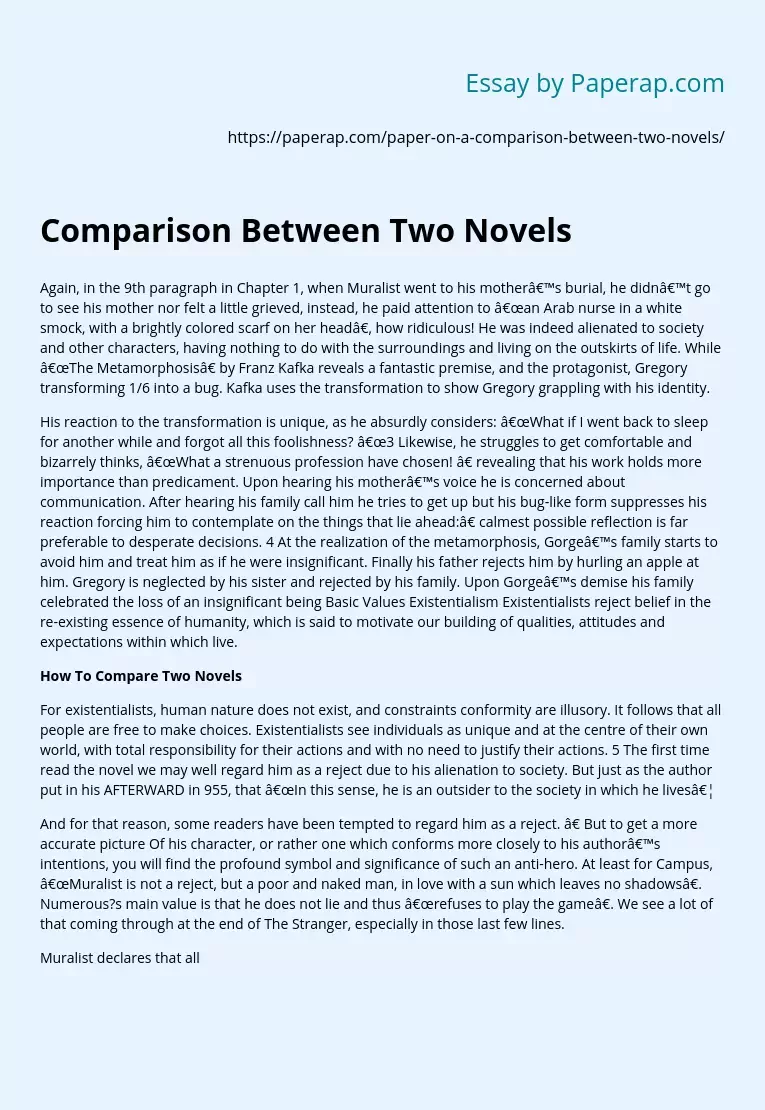Comparison Between Two Novels
Again, in the 9th paragraph in Chapter 1, when Muralist went to his mother’s burial, he didn’t go to see his mother nor felt a little grieved, instead, he paid attention to “an Arab nurse in a white smock, with a brightly colored scarf on her head”, how ridiculous! He was indeed alienated to society and other characters, having nothing to do with the surroundings and living on the outskirts of life. While “The Metamorphosis” by Franz Kafka reveals a fantastic premise, and the protagonist, Gregory transforming 1/6 into a bug.
Kafka uses the transformation to show Gregory grappling with his identity.
His reaction to the transformation is unique, as he absurdly considers: “What if I went back to sleep for another while and forgot all this foolishness? “3 Likewise, he struggles to get comfortable and bizarrely thinks, “What a strenuous profession have chosen! ” revealing that his work holds more importance than predicament. Upon hearing his mother’s voice he is concerned about communication.
After hearing his family call him he tries to get up but his bug-like form suppresses his reaction forcing him to contemplate on the things that lie ahead:” calmest possible reflection is far preferable to desperate decisions. 4 At the realization of the metamorphosis, Gorge’s family starts to avoid him and treat him as if he were insignificant. Finally his father rejects him by hurling an apple at him. Gregory is neglected by his sister and rejected by his family. Upon Gorge’s demise his family celebrated the loss of an insignificant being Basic Values Existentialism Existentialists reject belief in the re-existing essence of humanity, which is said to motivate our building of qualities, attitudes and expectations within which live.
How To Compare Two Novels
For existentialists, human nature does not exist, and constraints conformity are illusory. It follows that all people are free to make choices. Existentialists see individuals as unique and at the centre of their own world, with total responsibility for their actions and with no need to justify their actions. 5 The first time read the novel we may well regard him as a reject due to his alienation to society. But just as the author put in his AFTERWARD in 955, that “In this sense, he is an outsider to the society in which he lives…
And for that reason, some readers have been tempted to regard him as a reject. ” But to get a more accurate picture Of his character, or rather one which conforms more closely to his author’s intentions, you will find the profound symbol and significance of such an anti-hero. At least for Campus, “Muralist is not a reject, but a poor and naked man, in love with a sun which leaves no shadows”. Numerous?s main value is that he does not lie and thus “refuses to play the game”. We see a lot of that coming through at the end of The Stranger, especially in those last few lines.
Muralist declares that all he has left now is to wish for a crowd of spectators – but he doesn’t. One explanation for this is that the point isn’t for Muralist to feel less alone it’s that he can choose whether or not to be less alone. That he is able to choose, that he is aware of this ability, and that this is what defines his revelation. 6. “L opened myself to the gentle indifference of the world; finding it so much like myself… ” Campus’ presentation of the character makes one question the essence of passion in life as he shows: life is 5 3 4 Kafka, 11 Kafka, 14 Dry Sony.
Lecture Three : The Stranger Dry Sony. Lecture Three : The Stranger, Philosophical Literature 6 2/6 becoming a tedious task that is void Of purpose. Existentialism and the survival of an existential hero are peculiar as all the hero would do is live for the sake of living. 7 In comparison, Kava’s The Metamorphosis equally philosophical to The Stranger it strongly emphasizes on existentialism. The protagonist Gregory Jams is a sales man who strongly dislikes his job. He strongly desires to remove all the social burdens that afflict him. His desire illustrated by transformation into a “monstrous vermin”. Misinformation represents a way to escape from his human burdens, but that transformation also dehumidifies him and takes all the meaning and control of his life away. In this way he experiences the existentialism that goes along with him throughout the story until the time of his death. “Gregory now hardly ate anything anymore. Only when he accidentally Passed the food laid out for him would he take a bite into his mouth just for fun, hold it in for hours, and then mostly spit it out again”8 He becomes totally uninvolved to the point of having totally no interaction with anyone inside or outside of the family.
Gregory is totally abandoned by his family, does not eat and eventually dies. Gregory Jams allowed himself to die upon realizing that he was free from society burdens. In conclusion, The Metamorphosis highlights that one must interact with society in order to have a meaning In life, while portraying hopelessness in a life controlled by the standards of society. In the same manner.
Comparison Between Two Novels. (2019, Dec 05). Retrieved from https://paperap.com/paper-on-a-comparison-between-two-novels/

